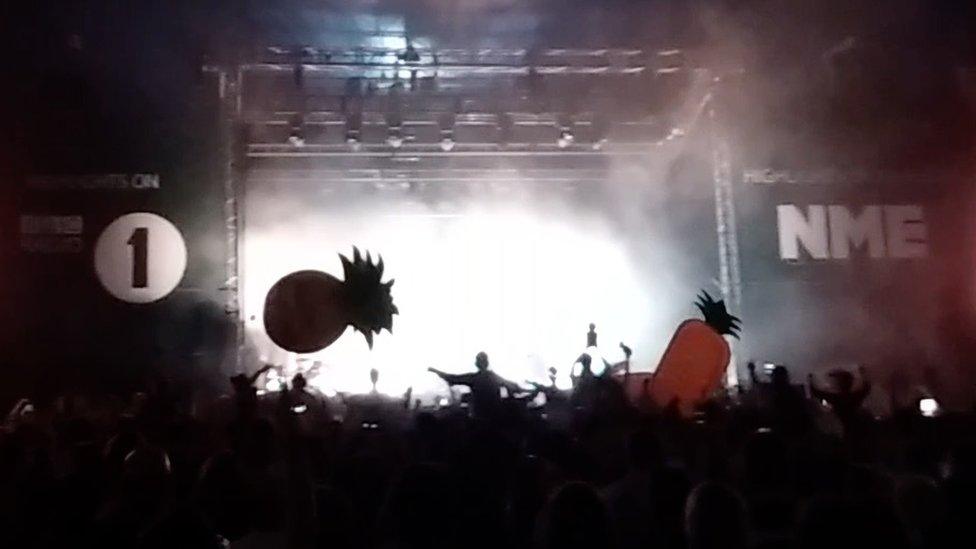Glass Animals: UK band's hit Heat Waves sets new record to top US chart
- Published

The four-piece group said they "didn't think it would really go anywhere"
UK band Glass Animals have gone to number one in the US with their sleeper hit Heat Waves, setting a new record for the longest time to reach the top.
The Oxford indie group's song spent 59 weeks on its slow ascent to the summit of the Billboard Hot 100.
The previous record was held by Mariah Carey's All I Want For Christmas Is You, on 35 weeks.
"I absolutely can't believe it," singer Dave Bayley said. "For it to do this means the absolute world."
He added in a Twitter message to fans, external: "This song came out at the beginning of the pandemic and we didn't think it would really go anywhere because of that, and it has because you guys have embraced it so much."


There are slow-burning hits, then there's Heat Waves - a song that took longer to reach room temperature than an ice age mammoth.
The song's 59-week trek to the top of the US Billboard chart eclipses the previous record-holder, Mariah Carey's All I Want For Christmas Is You, by a massive 24 weeks. With just one song, Glass Animals have spent 27 more weeks on the chart than The Prodigy have managed in their entire career.
The Oxford band also became the first UK group to break into Spotify's global top 10 since Clean Bandit in 2018 (Coldplay have since made the chart, too).
The song had all the right ingredients for a sleeper hit. Glass Animals were well respected in the industry, with a Mercury Prize nomination for their second album How To Be A Human Being - but they weren't big enough to have their song automatically added to radio station and streaming service playlists. It took months for Heat Waves to cross over from alternative radio to pop stations, building up a bigger head of steam as it went.
Streaming also played a crucial part in its success. Songs tend to have a longer half-life now than 10 years ago, as fans continue to play their favourite tracks, keeping them afloat for months on end.
Glass Animals were also given a late boost by TikTok, where creator Juliette Cullen used Heat Waves to soundtrack a viral video about a lack of curly fries in certain branches of McDonald's.
The band have joked its success is all down to Bayley's mum streaming it on a loop… but given that the song's been played 1.3 billion times on Spotify alone, she'd had to have started 9,900 years ago.
In reality, it's just a great song - one whose vibey production and low-key hooks reveal new treasures on each listen. Hopefully its success will encourage people to seek out the rest of the band's equally-rewarding back catalogue.

The song, which was originally released as a single in June 2020, first snuck into the US singles chart in 100th place in January 2021.
Allow YouTube content?
This article contains content provided by Google YouTube. We ask for your permission before anything is loaded, as they may be using cookies and other technologies. You may want to read Google’s cookie policy, external and privacy policy, external before accepting. To view this content choose ‘accept and continue’.
Most weeks ever to reach US number one:
59 - Heat Waves by Glass Animals, March 2022
35 - All I Want for Christmas Is You by Mariah Carey, December 2019
33 - Macarena (Bayside Boys Mix) by Los Del Rio, August 1996
31 - Amazed by Lonestar, March 2000
30 - All of Me by John Legend, May 2014
Heat Waves peaked at number five in the UK in October 2021.
Bayley, who wrote and produced the grower, told the BBC it had its genesis as far back as May 2018.
"We were winding down from touring our second album and I hired a studio in north London called The Church," he explained last year.
"I was in the little basement room, which used to be the kitchen - and I've recently found out that's where Bob Dylan used to sit and write. He only wanted to be in the kitchen, apparently.
"Anyway, I spent all day there… but I was fishing and catching rubbish. At the end of the day, I was ready to go home, but I just picked up a guitar to try one more time, and I just played those chords."
Related topics
- Published10 November 2021

- Published9 April 2021

- Published27 May 2021

- Published27 August 2017
